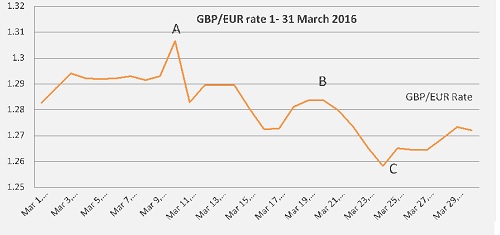Sterling Decline Against Euro Gathers Pace
Tuesday 05 April 2016
March proved to be another disappointing month for euro buyers as sterling continued its recent losses due to concerns ahead of the UK referendum, says Ben Scott.
However, it was the atrocities in Belgium on March 22nd which proved to be a strong catalyst for sterling losses, with GBP/EUR trading at a month low of 1.2582 (Interbank throughout) on 24 March, represented by point C on the graph. This is the lowest GBP/EUR level since December 2014.

Despite a slight increase in UK inflation, which remains significantly below target, economic growth in the UK remains extremely subdued with construction, manufacturing and service sector data all falling below forecast. All three sectors highlighting concerns that contraction is now a very real possibility, weighing heavily on sterling.
Given a poor start to March in terms of economic data, sterling gains were predominantly as a result of events elsewhere, with GBP/EUR reaching a high of 1.3066 at point A (10th March), despite weak data. Sterling, however, traded at an average rate of just 1.2803 throughout the month.
Sterling gained against the single currency as a result of concerns leading up to the European Central Bank’s (ECB) policy announcement on 10 March 2016, and the ECB did not disappoint.
The ECB announced a 10 basis point cut to its overnight deposit rate, taking the level to -0.4% in an attempt to push banks to lend more, stimulating economic growth by making it more expensive for banks to sit on funds without lending.
More significantly, the European Central Bank announced an increase in quantitative easing from €60 billion a month to €80 billion.
Whilst the increase in quantitative easing was initially seen as a negative (as it devalues the currency), euro losses leading to the high of point A were quickly reversed when the markets took ECB the announcements as an honour of a previous pledge from its president, Mario Draghi. He had previously stated that he would do “whatever it takes” to save the euro.
This was observed, with former Bank of England policy maker, Andrew Sentence, noting “the ECB have taken monetary policy to the limit and beyond”.
Weakness from point B came partly as a result of the Bank of England reducing growth forecasts, but more directly due to the aftermath of Chancellor George Osborne’s budget.
Whilst the budget in itself proved to be something of a non-event, the fallout was significant, with senior politician Ian Duncan Smith, Secretary of State for Work and Pensions, resigning in protest at George Osborne’s cuts to the welfare budget.
With Ian Duncan Smith firmly in the Brexit camp it was made to look like the resignation was more to do with the upcoming EU referendum. The sudden U-turn of the government, who then reversed the cuts, points to a weak chancellor and it was this political uncertainty which contributed to sterling weakness towards the end of March.
The atrocities in Belgium on 22 March 2016 lead to surprising market movement as the euro gained against sterling, leading to month-lows highlighted by point C, the reverse impact that might have been anticipated.
The reason for this surprise movement was that the markets felt the terrorist attacks could result in UK voters moving towards voting in favour of the UK leaving the European Union as a means of taking back control of immigration. This added to the ongoing uncertainty surrounding the referendum.
Outlook
Whilst pressure mounted on pro-Brexit campaigners to provide further substance to the argument for the benefits of the UK leaving the European Union, senior politicians joined high profile business leaders to throw their weight behind the campaign to keep the UK in the European Union. Significant names included Richard Branson, James Dyson and former Marks and Spencer boss Stuart Rose, giving sterling a boost as the UK appeared to take a step back from the unknown.
Whilst the Brexit campaign has been accused of failing to provide a strong argument for the benefits of the UK leaving the European Union, the pro-Europe campaign seemed based on heightening fear, as demonstrated by comments from Chancellor George Osborne, who warned a Brexit would be a “long, costly and messy divorce”. Foreign Secretary Philip Hammond also warned that Britain outside of the European Union would be “weaker, less safe and worse off”.
In a clear example of such tactics the Governor of the Bank of England (BoE), Mark Carney, warned that a “Brexit could weaken the pound and push up inflation”, and in an unprecedented move the BoE announced that extra emergency cash would be offered to Britain’s biggest lenders ahead of the EU referendum. This announcement was made, it seems, to ensure June 23rd did not spark another banking crisis. It is this uncertainty which looks set to weigh heavily on sterling leading up to the referendum.
Finally, the ECB’s policy announcement early in March effectively means that the European Central Bank is paying European banks to lend money to businesses to improve economic growth. This raises the question that if this policy fails what more can be done to improve economic conditions in Europe and to save the euro.
Ben Scott
Foreign Exchange Ltd
www.fcexchange.co.uk
Next Article: Getting Health Treatment in the UK
Thank you for showing an interest in our News section.
Our News section is no longer being published although our catalogue of articles remains in place.
If you found our News useful, please have a look at France Insider, our subscription based News service with in-depth analysis, or our authoritative Guides to France.
If you require advice and assistance with the purchase of French property and moving to France, then take a look at the France Insider Property Clinic.





